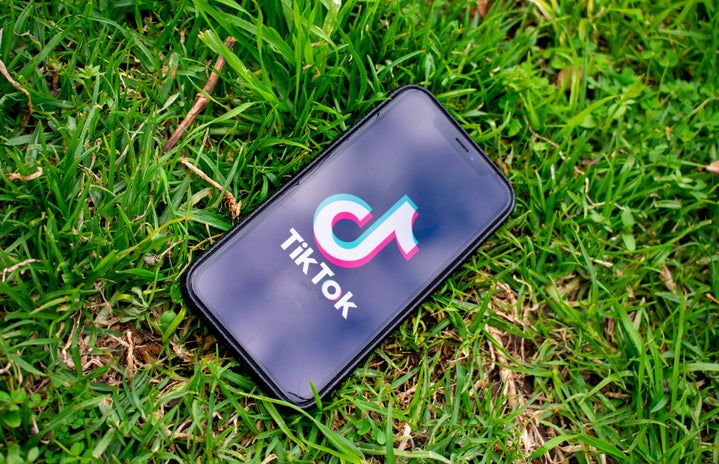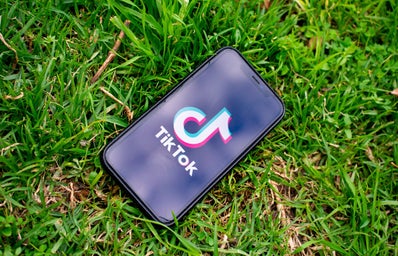Social media is a powerful platform for mental health and body positivity advocates. We often receive negative language surrounding body image from those close to us, so social media can be a tool to find communities of supportive body positivity. Popular creators such as Sienna Gomez, Mik Zazon, and Brittani Lancaster have been able to utilize apps such as TikTok to help spread messages of loving your body and normalizing regular eating habits. However, there are many sides of social media — especially on TikTok — that seem to be normalizing unhealthy relationships with food.
Pro-ana trends
The first thing that came to my attention was the trend to say things like “I only drink iced coffee in the mornings and an Adderall.” People were joking about drinking iced coffee all day and skipping two to three meals. It became normal for comment sections, especially in “what I eat in a day” videos, to see comments flooding in about coffee being a meal replacement.
I am not discounting people who truly have eating disorders, nor am I downplaying the struggle. The issue is, those comments — especially for someone like me who has battled with body dysmorphia — normalized eating habits that were not just unhealthy, but deadly. There is even a recently trending sound on TikTok that was joking about this. However, many people in the body positivity community have spoken about how dangerous this can be.
I truly believe that if all those commenters were skipping meals, they need to get help from a dietitian. However, people must take responsibility and understand that promoting and normalizing disordered eating habits on a platform with children as young as 12 and 13 is incredibly toxic. Saying this does not make you quirky, and isn’t something to either joke or brag about. Eating disorders and mental health-induced weight loss cannot ethically be turned into a meme. Even worse is the fact that eating disorders are known to be incredibly competitive. So, commenting that you skip meals and barely eat may make someone with an eating disorder even further reduce their caloric intake.
Although that trend was already bad enough in the normalization of eating disorders, I began to see comments on videos of thin people that said things like, “Well, I guess I’m not eating today.” Like the trend of skipping meals, this is incredibly triggering. However, I am shocked at the blatant way comments such as these promote unhealthy diet culture. First and foremost, it is impossible to know how those creators will interpret those comments on their TikToks. They may be struggling with an eating disorder as well, and so commenting things like “I guess I’m not eating today” or “I wish i had your body” could be incredibly damaging to their ability to recover. Secondly, even if the creator is not struggling with an eating disorder, those comments can promote insecurity or feelings of guilt. The point is, commenting on someone’s weight will never benefit them.
Similarly, much like the iced coffee trend, this normalizes not eating as a manner of weight loss, and glorifies thin bodies above all else. Often, the videos these users comment on make no mention of weight. Deciding to comment about weight centers weight as the focus of the conversation, and ignores the content these creators are making. Suddenly, a creator who made an innocent video has been reduced to their weight, as if it is their defining characteristic. I think that this is my biggest problem with TikTok. It has created a culture that thrives on the comparison, and especially on comparing weight.
The return of thinspo
However, creators are not completely innocent. There are many “fitness” and health accounts that are reminiscent of the “thinspo” phase we saw with Tumblr. I will not be linking to any of these creators, so as not to spread their harmful agendas. However, there are many creators who promote “fad” diets and workouts, all of which are introduced by the creator’s thin physique. While there are plenty of fantastic and healthy influencers, there are some that approach eating disorder level. Those who promote intense caloric deficits that create unattainable bodies are just as much to blame for promoting toxic diet culture. It is often these accounts that receive the “guess I’m not eating today” comments. Considering the BBC reports that simply being on the app has made many people feel way worse about their bodies, this is not to be taken lightly.
The final, and perhaps most concerning, type of videos are the “TW: ED” videos. Creators will often put a trigger warning at the front of videos in which they talk about their history with disordered eating, show pictures of them at their lowest weight, or talk about the ways they ate when they were suffering from their eating disorders. The problem with these videos is that I can almost assure you that anyone who ever suffered from an eating disorder will not scroll when they see that trigger warning. Because eating disorders are so competitive, people suffering from them often like to look at pictures of other people with eating disorders or listen to stories about them so that they can decide who was “sicker.” And while I understand the benefits of seeing someone’s recovery process, I also understand that there are people who will use those photos to say, “Oh, I’m not sick enough to seek help.”

So why is TikTok so bad?
We’ve seen content promoting eating disorders on other apps, but there really has not been anything quite like what we see on TikTok. On Instagram, Twitter, and Tumblr, you are mainly seeing the information of accounts you follow. Therefore, if someone were to post something promoting eating disorders, you could just block them and move on. But TikTok’s algorithm will show you videos regardless of whether you follow someone. And, as TikTok users know, the algorithm is really, really good about figuring out what to show you. Even worse, you cannot control if one video about eating disorders pops up; however, if you interact with that video at all, there’s a good chance that others will as well. For people with eating disorders, seeing these videos take over their FYP can be absolutely detrimental to recovery, and can also introduce people who don’t have an eating disorder to the world of eating disorders.
The most permeating theme here is that TikTok is a platform that feeds off of showing you what you want to see. The algorithm is scarily specific, so if your app can begin to realize that maybe you have a disordered relationship with food (even if that relationship hasn’t become a full-fledged eating disorder), you’re going to start seeing more and more of those videos. And, as you watch them, it’s going to be harder for you to look away. Right now, my FYP is filled with diet plans, low-calorie meals, and crazy weight loss changes. To fix this, I’ve been trying to say “Not Interested” to any video that seems to promote diet culture or unhealthy relationships with food. I recommend you do the same. However, it’s not always enough. And even though TikTok has made some effort in promoting National Eating Disorders Awareness Week, including hashtag PSAs with input from the National Eating Disorders Association, there’s still a long way to go before the platform is safe for those recovering from eating disorders.
With the way eating disorders are characterized by competition, it’s no wonder that an app such as TikTok is reverting back to normalizing them, and even glorifying them. Just remember that you do have control over the toxic messages you see, and you don’t have to listen to them. Fill your FYP instead with funny dances, body positivity, and the content you want to see. You are thriving in your own unique body, remember to love it as much as it loves you.


